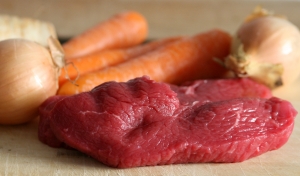I have debated for a while, probably years, whether or not to go organic. I have finally made the decision to start switching over to the green side, at least for some things. Organic foods do not use synthetic pesticides, antibiotics, or hormones in their production. The animals are treated better, fed organic feed, and are free to roam. We always talk about wanting to “go green” as a family and buying organic is a small way to implement that plan.
I often watch the multitude of strawberries and celery sticks my son consumes and think about all the chemicals that are going into his little body. He devours yogurt like it's ice cream and often uses it as a dip. I like the fact that he loves his fruits and vegetables, but as his mom, I want to do what is best for him. All the cheese and chocolate milk he enjoys so much is loaded with hormones and antibiotics. I can no longer pretend that I am doing my best for my family without buying certain items organic.
The problem is that we live on one income and a very tight budget. Organic foods can cost at least twice as much as conventional ones. Within the past couple months, we have increased our grocery budget in order to help purchase more protein products during our participation of an exercise and nutrition program. But the bottom line is, I feel like God is calling us to eat more naturally. It is better for us and the environment. I have some guidelines on how to make the organic switch on a budget.
1. Buy organic when it comes to the Dirty Dozen.
The top twelve fruits and vegetables that are contaminated with pesticides are apples, celery, cherry tomatoes, cucumbers, grapes, hot peppers, nectarines, peaches, potatoes, spinach, strawberries, and sweet bell peppers.
2. Stick to the Clean 15.
There are fifteen fruits and vegetables that are the least exposed to pesticides. When buying these foods, choosing conventional is cheaper than organic and helps when on a budget. They are asparagus, avocados, cabbage, cantaloupe, sweet corn, eggplant, grapefruit, kiwi, mangoes, mushrooms, onions, papayas, pineapples, sweet peas (frozen), and sweet potatoes.
3. Invest in organic meats and dairy.
To avoid antibiotics and synthetic hormones, buying organic meats, milk, cheeses, and eggs is the best way to go. They have high levels of pesticides and antibiotics used in conventional production.
I am praying we can make the switch gradually and still fit it into our budget. We have already bought organic milk and I am eager to buy more organic food as we restock our shelves in the cupboard, refrigerator, and freezer. I want to do what is best for my family and our wallet.
Copyright 2013 Tanya Weitzel
About the Author

Guest
We welcome guest contributors who graciously volunteer their writing for our readers. Please support our guest writers by visiting their sites, purchasing their work, and leaving comments to thank them for sharing their gifts here on CatholicMom.com. To inquire about serving as a guest contributor, contact editor@CatholicMom.com.



.png?width=1806&height=731&name=CatholicMom_hcfm_logo1_pos_871c_2728c%20(002).png)
Comments